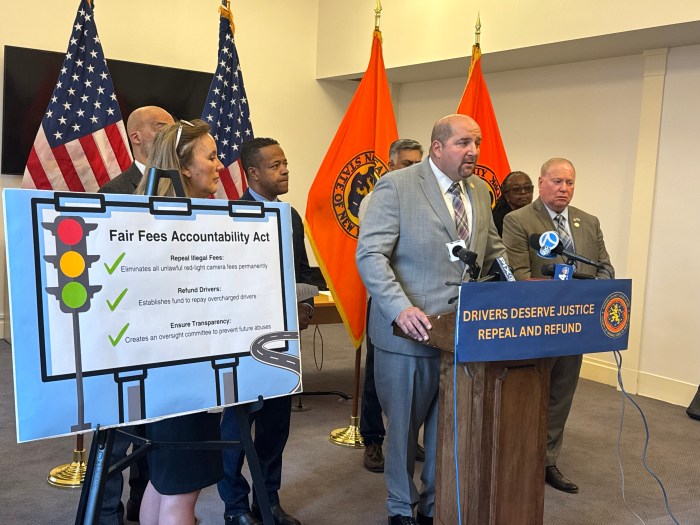On July 6, the Plainview-Old Bethpage School District Board of Education held their annual organization meeting. New trustee Emily Schulman took the oath of office, while Garry Bettan and Amy Pierno were appointed to the positions of president and vice president, respectively.
During board announcements, Bettan commented on the success of the recently-graduated POBJFK HS Class of 2010: “This class really set a bar that I hope that all of our future classes can reach and exceed.” He noted that members of the graduating class got into some of the most selective colleges in the country including Harvard, Princeton, Brown, Cooper Union, and MIT.
Lisa Schack, event manager of Relay for Life, came up to the microphone to thank the board for their continued support of the charitable fundraiser. This year, Relay for Life raised $90,000 for the American Cancer Society, contributing to a total of $750,000 dollars raised over the last seven years. Funds raised as a part of the relay go toward education, treatment, and services for cancer patients. “It certainly is not the norm that we have such a backing from the school board, and without you behind us, I don’t know if we would have been as successful as we are,” said Schack.
“As a board member, I’m proud to live in a community that, even in financially hard times, still comes out to support this very worthy cause,” commented trustee Ginger Lieberman about Relay for Life. Schack presented the board with a citation from Legislator Judy Jacobs and an award from the American Cancer Association, recognizing Nassau County as one of the top 10 counties in the nation for cancer research.
In Superintendent’s announcements, Superintendent Gerard W. Dempsey, Jr. commented that, to his surprise, his inquiry into the mistaken omission of POBJFK HS from the Newsweek top high school’s list led to a discussion with Jay Mathews, who determined the methodology for the list. According to Dempsey, Mathews was very apologetic and promised that the list would be corrected with the proper ranking for the high school and updated on Newsweek’s website by mid-July. Dempsey said that the district website would probably be updated once the correction had been made.
There was much debate among the board members on the subject of potential appointments as a result of an unanticipated federal grant. Dempsey explained that due to a small change in population, the district had not received Title 1 federal funds, which are used for literacy programs, for the 2009-2010 school year, and were not anticipating the use of those funds for the upcoming school year. However, the board recently received notice that they will be receiving a grant of $93,000 for the 2010-2011 school year, which Dempsey and Assistant Superintendent of Curriculum Jill Gierasch propose putting toward the hiring of two literacy coaches. The idea of hiring literary coaches has been presented to the board before, but did not appear to be feasible.
“Initially when we spoke about this, I really felt that we needed one literacy coach- ideally- in every elementary school,” said Gierasch. “With the economic times that we are in right now, I realized that, you know…that’s pie in the sky.” Gierasch went on to say that the prospect of hiring one literacy coach for the entire district was discussed, but that it was believed the individual would be spread too thin to be effective. Dempsey clarified that the $93,000 would not cover the full cost of salary for two literacy coaches, but would partially finance the staffing additions. Dempsey also suggested putting the funds toward one coach, in which case the federal grant money would likely be sufficient, however there was still the concern of overextending the individual to consider.
Members of the board had many concerns with hiring two individuals based on federal grant money that may not be consistently available, as well as concerns about the potential value of literacy coaches.
“The only issue I have is the fact that we have just crossed over that threshold in order to be able to have access to these funds. That doesn’t mean that in the future, that we will be crossing that threshold,” said Angel Cepeda. “So we may not have that money, and then once we’re committed, now we’re committed to $200,000 at least…if this is the area that we want to commit money to, then where are we going to look to see about having some reductions somewhere else?” Cepeda continued.
Lieberman shared Cepeda’s concerns, and also noted that she prefers lowering class size as opposed to bringing many different kinds of specialists into the classroom. Evy Rothman commented that the district has paid so much attention to literacy lately that it is not clear precisely why further literacy programs are necessary. “We seem to be doing so much with literacy…what more are they hoping to accomplish than we’re already doing?” asked Rothman. Gierasch explained that there is still a lot of useful information out there that is not known to most classroom teachers, which the literacy coaches could articulate, and that the coaches would be required to teach on a .4 schedule. The teaching requirement means that the coaches would be dealing with the classroom situation directly, and not just work on a staff development level, Gierasch said.
Several board members requested a more detailed estimate of what the two coaches would cost the district, which Dempsey said could be produced without difficulty, although it would be an approximation. In addition, Gierasch said she would make research about the efficacy of literacy coaches available for the board to peruse. It was decided that the issue would be reopened once the board members had more information available.




























